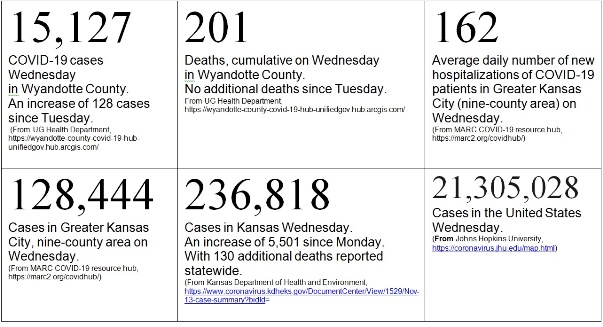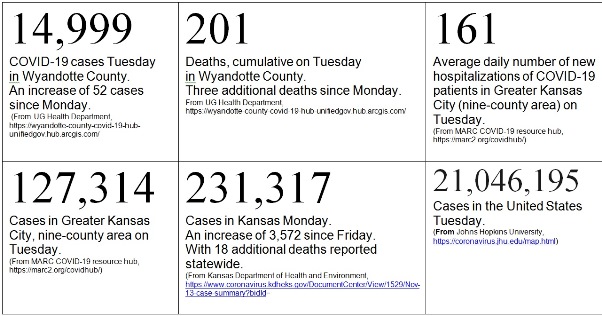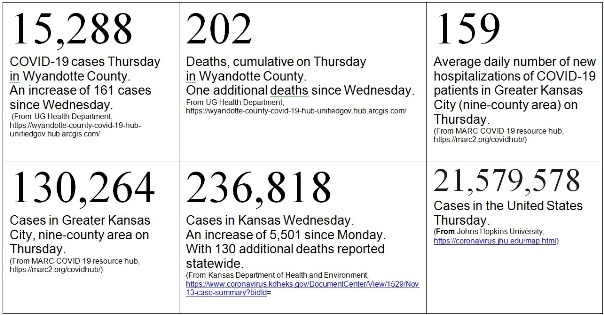
The Unified Government Health Department is asking all health care agencies in Wyandotte County to sign their staff members up for COVID-19 vaccines if they have not done so already.
According to an announcement on Thursday, health care workers may be eligible if they live or work in Wyandotte County and provide direct patient care.
“Healthcare workers put their health at risk every day to serve our community, and we want to make sure all of these workers in our county have the opportunity to get vaccinated,” said Juliann Van Liew, director of the Health Department. “I’m happy to say that we have already provided more than 1,500 doses of the Moderna vaccine through our site at the former Kmart building, but we know there are still more healthcare workers in our community who haven’t come through our site yet. That’s why we are putting the call out to healthcare employers to sign up to get their staff vaccinated.”
How to sign up
At this time, health care vaccines sign-ups need to be done through employers on behalf of their health care staff or contractors. Employers can sign up their staff by going to bit.ly/HealthcareVaccines or by going to wycokck.org/COVID-19 and clicking on the health care vaccines button.
Health care workers who are affiliated with a hospital system should be provided the opportunity to get vaccinated through the hospital facility with which they work.
Additionally, other Wyandotte County residents will soon be able to fill out a survey to indicate that they are interested in getting vaccinated. They will be able to provide contact information to receive vaccine availability updates. This survey will be available by the end of the week at wycokck.org/COVID-19. More information is at wycokck.org/COVID-19 or by calling 3-1-1.
Health Department received 2,900 vaccine doses
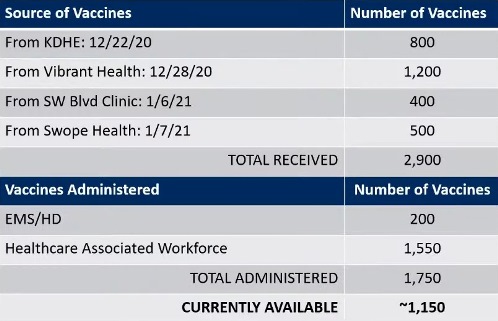
At the UG Commission meeting Thursday, Van Liew said that as of Thursday, the UG Health Department had received a total of 2,900 COVID-19 vaccine doses.
They have administered 1,750 so far, with 1,150 currently available, she said.
Two hundred doses have gone to the EMS workers and Health Department workers, while 1,550 have gone to health care associated workforce, she said.
Any kind of health care worker, including primary care, dental care, mental and behavioral care, as well as the nurses, doctors, other staff working in the offices in Wyandotte County is eligible for the vaccines, she added.
The UG Health Department received 800 vaccine doses from the Kansas Department of Health and Environment on Dec. 22, she said.
Additionally, the Health Department received 1,200 vaccine doses from Vibrant Health on Dec. 28, as well as 400 doses from the Southwest Boulevard Clinic on Jan. 6 and Swope Health on Jan. 7.
She said the Health Department was very appreciative to the clinics for sharing the vaccines.
The three health care providers believe strongly that there is a need to get the vaccines to health care partners, she said.
The UG Health Department can handle a much larger number of vaccine recipients at its site at the former Kmart building at 78th and State than other health departments in the state, she said.
They are not holding back vaccines, and they have 1150 on hand currently because they have received 900 doses in the last two days, she added.
They are giving out the vaccines as quickly as they are receiving it, she said. More than 200 doses are scheduled to be given out on Friday.
While they are not sure of the next allotment from the state and the amount, they think it will be Monday or Tuesday, and more than the initial 800, she said.
Changes to priority list for vaccines
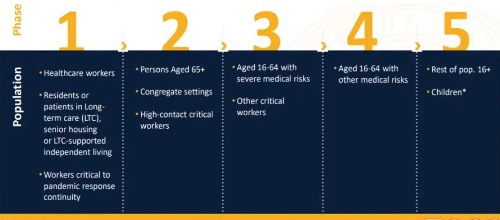
On Thursday, the governor announced some changes to the priority list for vaccinations in Kansas.
Van Liew said Phase 1 now includes health care workers; residents or patients in long-term care, senior housing or long-term care supported independent living; and workers critical to the pandemic response continuity.
The critical workers are a change. The UG is now able to vaccinate its critical workers in local government, those who keep the power and lights on, keeping the system running every day, she said. They can now vaccinate some UG staff, Bonner Springs and Edwardsville staff who are doing critical infrastructure work, she said. They hope to start those vaccinations very soon, she said.
Phase 2 is now persons aged 65 and older, congregate settings and high-contact critical workers, Van Liew said. The age was lowered from 75 to 65 with Thursday’s announcement.
A team will try to target the age 65 and older group, she said. They are waiting for more detail on who is in high contact critical workers, she said. They are waiting on more information on it.
Gov. Laura Kelly announced on Thursday that the high contact critical worker group will include firefighters, police officers, first responders, and correction officers; grocery store workers and food services; K-12 and child care workers, including teachers, custodians, drivers, and other staff; food processing, including meat processing plants; large-scale aviation manufacturing plants; transportation workers; workers in retail, agriculture, supply of critical services or materials for COVID-19 response; the U.S. Postal Service, and department of motor vehicles.
According to the governor, congregate settings will include licensed congregate settings; homeless shelters; congregate child care institutions; emergency shelters or safe houses; corrections facilities; and behavioral health institutions.
Phase 3 will include those aged 16 to 64 with severe medical risks and other critical workers.
According to the governor, the severe medical risks are cancer; chronic kidney disease; chronic obstructive pulmonary disease; Down Syndrome; heart conditions like cardiomyopathies; immune-compromised state from solid organ transplant; Type 2 diabetes; sickle cell disease; and pregnant patients.
The governor stated that other critical workers who are not in government positions and who cannot work remotely, in Phase 3, will include agricultural and food workers not included in previous phases; workers performing in-person activities indoors, in critical manufacturing, not included in previous phases, including aviation and production of critical supplies for the COVID response; utility workers; social service and government workers not included in previous phases; logistics workers, such as truck transportation workers, couriers and others; water and wastewater workers; shelter and housing workers, finance workers; information technology and communications workers.
Phase 4 includes those aged 16 to 64 with other medical risks.
The other medical risks, according to the governor, include asthma; cerebrovascular disease; cystic fibrosis; immune-compromised state from blood or bone marrow transplant, immune deficiencies, or use of immune weakening medicines; neurologic conditions such as dementia; liver disease; pulmonary fibrosis; Type 1 diabetes; obesity and severe obesity.
Phase 5 includes the rest of the population, age 16 and older, and children, when vaccines are approved for them.
Van Liew said they were adjusting their strategies on Thursday after receiving the new priority list, and they plan to follow the KDHE priorities.
When you can get the vaccine depends on various factors, such as your age, medical conditions, if you are a health care worker, and whether you work in close contact with others at essential jobs.
To get notified for a vaccine, residents are asked to complete a Health Department survey, and they will be contacted when the Health Department is ready, she said.
For example, a 70-year-old resident who fills out the survey and lists his age would be contacted directly by the Health Department when the vaccine is ready, she said. For those who don’t have a computer, smart phone or the internet, they can call 311 and give their survey information, she said.
Bob Bennett, Health Department vaccine distribution director, said the Health Department is working with a local firm to create the registration system. Full use will probably be in Phase 2.
Case numbers reported
KU Health System reported that the number of active COVID-19 patients on Thursday morning was at a high plateau. There were 75 COVID-19 active patients in the hospital, up five from Wednesday, with 26 in the intensive care unit, a decrease of three from Wednesday, and 11 on ventilators, a decrease of three from Wednesday, according to Dr. Dana Hawkinson, medical director of infection prevention and control. There were 66 other patients in the recovery phase, an increase of 10 from Wednesday. The total was 141 patients, an increase of 15 since Wednesday.
Wyandotte County reported an increase of 161 COVID-19 cases on Thursday, Jan. 7, according to the Unified Government’s COVID-19 webpage. There were a cumulative 15,288 cases. There was one additional death reported Thursday, for a cumulative total of 202.
The Mid-America Regional Council Kansas City Region COVID-19 hub on Thursday reported 130,264 total cumulative cases, with, 1,574 total cumulative deaths in the nine-county Kansas City region. The average number of new hospitalizations was 159.
The Johns Hopkins University COVID-19 dashboard on Thursday reported 21,579,578 total cumulative cases in the United States, with 365,317 total deaths statewide .
Free COVID-19 testing available Friday
The Unified Government Health Department’s COVID-19 test site at the former Kmart building at 78th and State will be open on Friday, Jan. 8, with testing from 9 a.m. to 3 p.m.
Tests are free for those who live or work in Wyandotte County. The tests are nasopharyngeal swab tests. The Health Department no longer uses saliva tests.
The tests now are open to asymptomatic people as well as those who have symptoms or have been exposed to COVID-19. Check with the UG Health Department’s Facebook page to see if there have been any changes in the schedule. Bring something that shows that you live or work in Wyandotte County, such as a utility bill.
More COVID-19 tests will be available from 9 a.m. to 5:30 p.m. Friday at the Pierson Community Center, 1800 S. 55th St., Kansas City, Kansas. These tests are through WellHealth Management. For more information and to schedule a test, visit www.GoGetTested.com/Kansas.
Testing sites are at https://wyandotte-county-covid-19-hub-unifiedgov.hub.arcgis.com/pages/what-to-do-if-you-think-you-have-covid-19.
For more information about the testing site at the former Kmart location, visit https://alpha.wycokck.org/files/assets/public/health/documents/covid/10092020_newtestingsitewyco.pdf.
To see information about the UG giving vaccines to health care workers, visit https://wyandotteonline.com/ug-to-start-giving-covid-19-vaccines-to-health-department-and-ems-personnel-next-week/.
The KDHE vaccine report is at https://www.coronavirus.kdheks.gov/DocumentCenter/View/1708/COVID-19-Vaccine-Updates–123020-FINAL-PDF?bidId=.
Cards and letters of encouragement for caregivers at KU Health System may be sent to Share Joy, care of Patient Relations, 4000 Cambridge St., Mailstop 1021, Kansas City, Kansas, 66160. Emails can be sent to [email protected].
Wyandotte County is under a mandatory mask and social distancing order. Also, the Wyandotte County health order with a limit of 10 persons to a gathering, and a closing time of 10 p.m. for restaurants and bars, with other new restrictions, is at https://alpha.wycokck.org/files/assets/public/health/documents/covid/11162020localhealthorderexecuted.pdf.
The UG COVID-19 webpage is at https://alpha.wycokck.org/Coronavirus-COVID-19-Information.
The KDHE’s COVID-19 webpage is at https://www.coronavirus.kdheks.gov/.
The KC Region COVID-19 Hub dashboard is at https://marc2.org/covidhub/.
The Wyandotte County page on the Johns Hopkins COVID-19 website is at https://bao.arcgis.com/covid-19/jhu/county/20209.html.

